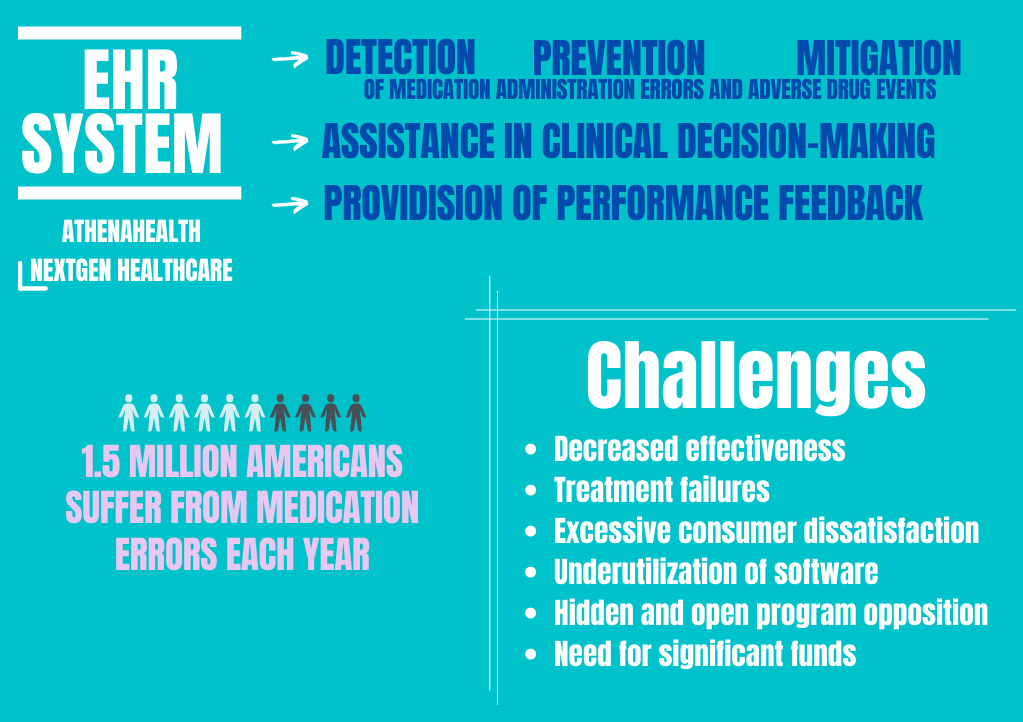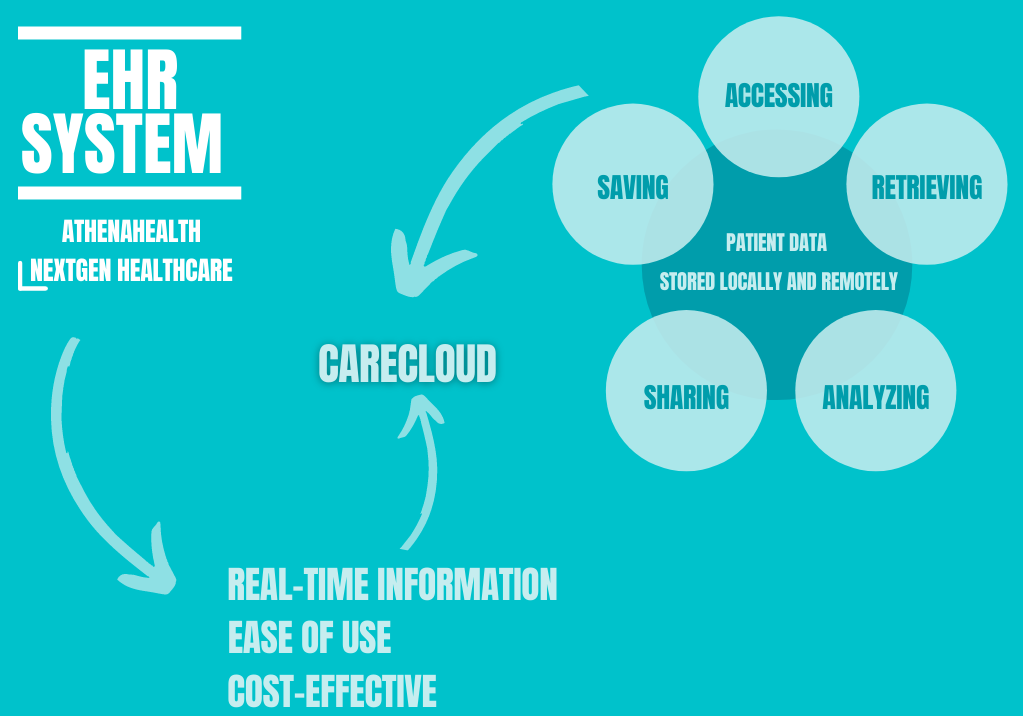Athenahealth and NextGen Healthcare Products
Description of Clinical Issue
In the healthcare industry, medication errors and adverse drug events are serious problems. They cause harm to more than 1.5 million Americans each year and have severe implications for nurses (Da Silva & Krishnamurthy, 2016). By reducing human mistakes and connectivity problems, modern informatics and technologies will help address both of these issues. Software for administering medications electronically, such as Athenahealth and NextGen Healthcare, is a solution to nursing medication administration errors. This software improves patient safety by detecting, preventing, and mitigating medication administration errors and adverse drug events. They also assist in clinical decision-making and providing performance feedback.
Products Overview
NextGen Healthcare is an EHR system that uses barcoding to offer patient safety solutions through increased automation, accuracy, ease of operation, speed, and cost-effectiveness. This allows identifying adverse effects early, even before they occur, to avoid them and mitigate or eradicate clinician/nurse burnout. Athenahealth is an EHR system that has incorporated Epocrates, a mobile drug reference, into AthenaClinical. This allows doctors to find appropriate dosing when prescribing medicine.

Why Choose the Products
Athenahealth and NextGen Healthcare’s products were chosen to provide ease in transition to electronic health records and additional safety to reduce medication errors. Both systems’ flexibility was also taken into consideration as nurses do not have to depend on a computer, therefore increasing the ease of use. The systems provide detailed patient information and various critical medication safety features (Jelec et al., 2016). Nurses should check medication orders and provide real-time documentation at the point of care. The software is easy to use in training nurses and is easy to implement, making nurses feel confident.
Evaluation for Implementation
The first approach is by conducting a study to fix any compatibility challenges such as decreased effectiveness, errors, treatment failures, excessive consumer dissatisfaction, underutilization of software, reinstallations, additional support staff to install and manage programs (Jelec et al., 2016). Other challenges include hidden and open program opposition and the need for significant funds to upgrade and resolve problems. The different researchers analyze statistics on drug administration failures obtained before and during the product’s launch. Determining whether the commodity has some workarounds that may be leading to noncompliance is also effective.
Evaluation after Implementation
Form an ongoing interdisciplinary committee of nurses, pharmacists, and data information experts who can deal with workflow problems and are certified as super-users to deal with any issues before and after implementation (Jelec et al., 2016). All employees, including administrators, accounting, physicians, nurses, and pharmacists, should be thoroughly trained. This will help people better understand processes and improve service continuity in the healthcare sector. Adult learning approaches can be used, with plenty of hands-on learning time and continuing assistance during deployment and troubleshooting after the actual implementation.
Future Trends
Future trends include using barcodes with appropriate prescriptions and warning signs for errors and an additional radio frequency identification. RFID technology can scan several items in seconds, allowing a person to check all of the content at once because it contains more information. Without permission, it is often possible to read personal information. This, too, has raised significant privacy and security issues.
CareCloud and Advanced Data Systems Products
Description of Clinical Issue
Various businesses are concentrating on developing healthcare management products. EHR software is essential for saving, retrieving, accessing, sharing, and analyzing patient data stored locally and remotely using cloud services (Isaac et al., 2018). Medical companies and EHR products must choose the right products. Electronic health record (EHR) software features differ from one to the next, depending on the developer companies’ differentiation approaches.
Products Overview
The CareCloud EHR product was developed by a private corporation in Miami in 2009 to help healthcare professionals handle their data more effectively and efficiently. It uses cloud services to reduce the need for documentation in healthcare data storage (Isaac et al., 2018). Founded in 1947, the Advanced Data System Corporation (ADSC) boosts productivity and efficiency through the Medics Suite of proven health, operational, and management automation for practices and medical billing agencies.

Why Choose the Products
I chose these products because they offer real-time information depending on what is entered into the systems. Moreover, the products also provide ease of use and are cost-effective.
Evaluation for Implementation
The first suggestion of how the products could be implemented is the ease of use in implementing the EHR products. The whole procedure is structured to enhance data entraining, storage, and reading quality and effectiveness. Second, the amount of time it takes to retrieve data is another factor to consider when selecting a device. The program should still be simple to use and allow for quicker data processing, whether locally or from the cloud (Isaac et al., 2018). The presentation of data is also an essential aspect of software features for transparency and understanding. CareCloud, for example, provides analyzed data to help physicians make fast decisions. Clarity is a decision-making aid that enables the provision of high-quality healthcare.
Evaluation after Implementation
The considerations include developing a patient interface on the data software that allows clients to view their health records. Patients can access their medical records via the patient portal. The backup and retrieval of data are the final requirements (Practice Management |EHR Software, 2019). The provision of evidence is an excellent source of leverage when it comes to providing high-quality healthcare. If something goes wrong, the medical enterprise should know how likely it is to recover results. As a result, cloud survival is critical for EHR.
Future Trends
Future trends include integrating natural language processing for better patient treatment. Most of the data stored are unstructured or handwritten. NLP approaches can capture unstructured data, analyze the grammatical structure, determine the meaning of the data, and summarize the data. As a result, NLP strategies will lower costs while still extracting data for in-depth big data analytics.
References
Da Silva, B. A., & Krishnamurthy, M. (2016). The alarming reality of medication error: A patient case and review of Pennsylvania and National data. Journal of Community Hospital Internal Medicine Perspectives, 6(4), 31758.
Isaac, T., Rosenthal, M. B., Colla, C. H., Morden, N. E., Mainor, A. J., Li, Z., & Sequist, T. D. (2018). Measuring overuse with electronic health records data. The American Journal of Managed Care, 24(1), 19-25.
Jelec, K., Sukalic, S., & Friganovic, A. (2016). Nursing and Implementation of Modern Technology. Signa Vitae – A Journal in Intensive Care And Emergency Medicine, 12(1), 23–27.
Practice Management | EHR Software | CareCloud. (2019). Improve Outcomes. Web.
